Showing 251-260 of 424 results
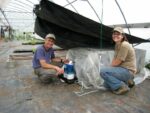 southern.sare.org news southern-sare-graduate-student-grant-call-for-proposals-now-open
southern.sare.org news southern-sare-graduate-student-grant-call-for-proposals-now-open Southern SARE Graduate Student Grant Call for Proposals Now Open
Graduate Student Grants are one of the few programs providing young researchers the opportunity to study sustainable agriculture techniques.
 western.sare.org news grassland-restoration-in-the-desert-southwest
western.sare.org news grassland-restoration-in-the-desert-southwest Grassland Restoration in the Desert Southwest
Early settlers’ descriptions of southeast Arizona told of uninterrupted grassland stretching from one mountain range to another. That’s changed. Today much of that land has been invaded by mesquite and other woody shrubs and the ecological services provided by the grassland – including water recharge into the underground aquifers – has been diminished. One reason […]
 western.sare.org news remembering-jackson-phillip
western.sare.org news remembering-jackson-phillip Remembering Jackson Phillip
Jackson Phillip, long-time Western SARE PDP State Coordinator from Micronesia, passed away in September 2021. In his capacity of ANR Program Coordinator at the College of Micronesia, FSM, Jackson fulfilled his State Coordinator role since the very beginning of the Professional Development Program. That was in 1994 and former Associate PDP Coordinator Al Kurki remembers […]
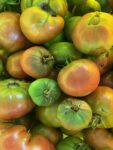 southern.sare.org news tomato-biostimulant-green-algae-sustainable-agriculture
southern.sare.org news tomato-biostimulant-green-algae-sustainable-agriculture Farmer Studies the Effects of a Biostimulant on Tomato Vigor and Yields
JOHNS ISLAND, South Carolina – Applying a green microalga, in combination with compost, to tomato plants appears to improve plant vigor and increase crop yields, according to the results of a one-year Southern Sustainable Agriculture Research and Education (SSARE) Producer Grant. Farm managers Dale Snyder, Jennifer Wicker and George Taylor of Sweetgrass Garden were interested […]
 northeast.sare.org news november-december-2021-innovations-newsletter-features-urban-farming-projects
northeast.sare.org news november-december-2021-innovations-newsletter-features-urban-farming-projects November-December 2021 Innovations Newsletter Features Urban Farming Projects
Check out our latest Innovations newsletter that features recently funded urban agriculture projects, open staff positions and a call to farmers interested in serving on Northeast SARE's Administrative Council.
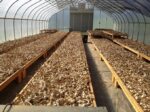 northeast.sare.org news northeast-sare-awards-708591-in-grants-to-work-in-partnership-with-farmers
northeast.sare.org news northeast-sare-awards-708591-in-grants-to-work-in-partnership-with-farmers Northeast SARE awards $708,591 in grants to work in partnership with farmers
Northeast SARE's Administrative Council recently awarded 27 Partnership Grant proposals for the 2021 grant cycle, totaling $708,591. These projects are now underway with the goal of working in direct partnerships with farmers to encourage innovative solutions to current sustainability challenges related to production, marketing, and/or farmer and community well-being in Northeast farming and food systems. […]
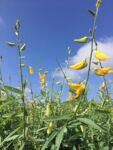 southern.sare.org news sunn-hemp-effective-for-weed-control-in-fall-organic-crops
southern.sare.org news sunn-hemp-effective-for-weed-control-in-fall-organic-crops Sunn Hemp Effective for Weed Control in Fall Crops, Producer Grant Research Finds
CHESTER, South Carolina – Farmers with a certified organic diversified vegetable farm in South Carolina are seeing some success with using sunn hemp as a crimped cover crop to suppress weeds in fall brassica crops. Wild Hope Farm, located in Chester, S.C., received a Southern Sustainable Agriculture Research and Education (SSARE) Producer Grant to explore […]
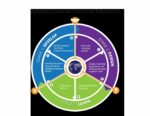 western.sare.org news creating-community-partnerships-to-improve-oregon-pest-management
western.sare.org news creating-community-partnerships-to-improve-oregon-pest-management Creating Community Partnerships to Improve Oregon Pest Management
A few recent IPM extension projects in Oregon didn’t begin the way so many extension efforts do. They didn’t start with a workshop. They didn’t start with a field day. They didn’t start with teaching or any sort of telling. They started with a question. “We’d ask, ‘If Oregon State University was doing all the […]
 www.sare.org news sare-welcomes-new-associate-director-dr-kristy-borrelli
www.sare.org news sare-welcomes-new-associate-director-dr-kristy-borrelli SARE Welcomes New Associate Director Dr. Kristy Borrelli
The Sustainable Agriculture Research and Education Program (SARE) is pleased to announce that Dr. Kristy Borrelli has been hired to serve as its new associate director.
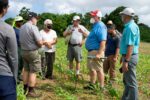 western.sare.org news getting-the-diagnosis-right-guam-workshop-focuses-on-foliar-fungal-diseases
western.sare.org news getting-the-diagnosis-right-guam-workshop-focuses-on-foliar-fungal-diseases Getting the Diagnosis Right: Guam Workshop Focuses on Foliar Fungal Diseases
In farming, as in medicine, an accurate diagnosis is critical. For a doctor to prescribe the correct treatment, they need to know the specific disease causing a patient’s symptoms. The same is true for growers. When they see disease symptoms in a field, they need to know the underlying cause in order to correctly treat […]